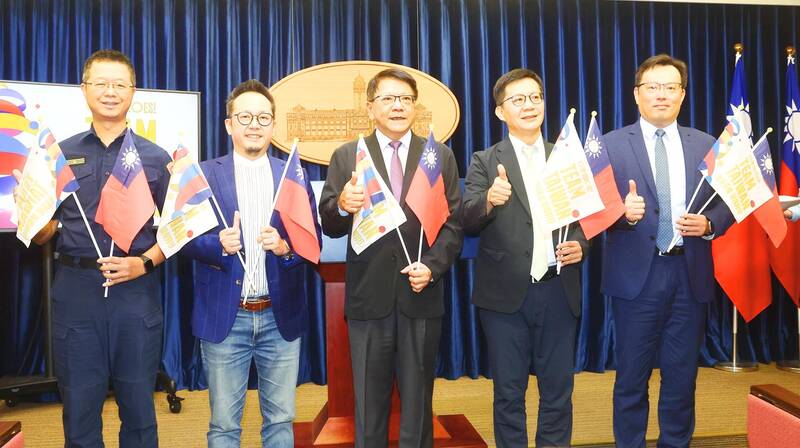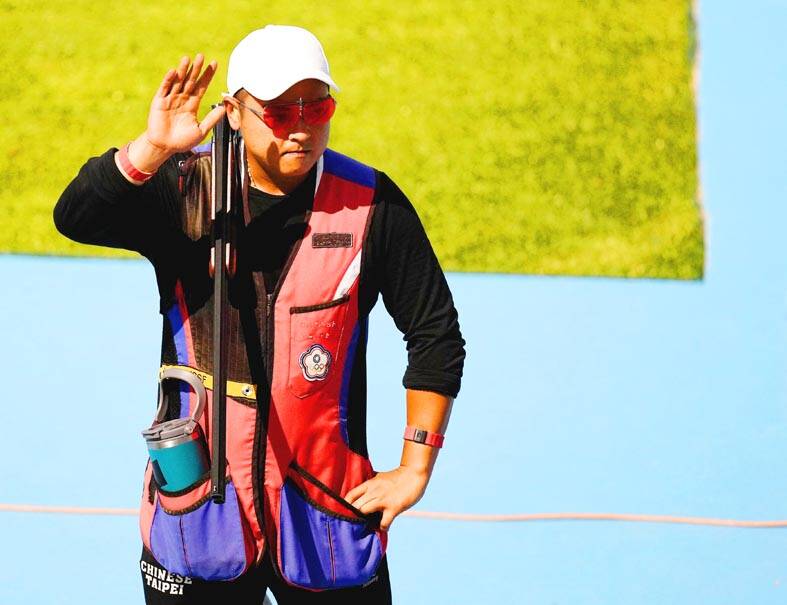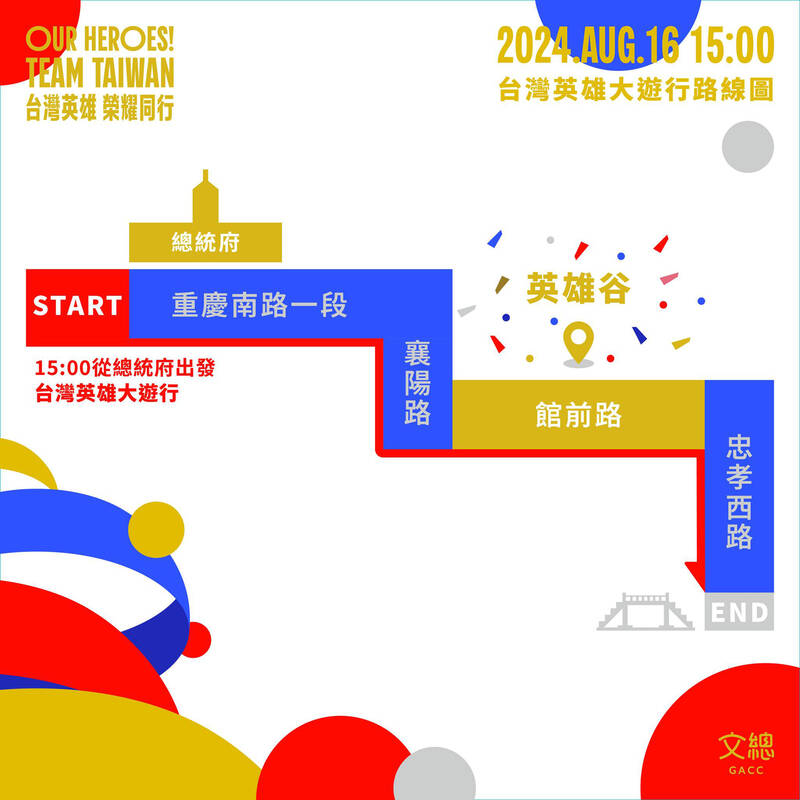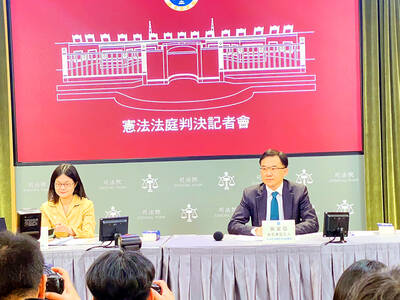Dozens of Taiwanese athletes who competed in the Paris Olympic Games are to take part in a parade in Taipei tomorrow afternoon, along with their families and coaches.
The parade is to start on Chongqing S Road, Sec 1, outside the Presidential Office Building at 3pm, General Association of Chinese Culture secretary-general Lee Hou-ching (李厚慶) told a news conference.
The procession is to travel down Xiangyang Road and Guanqian Road before ending on Zhongxiao W Road, Lee said.

Photo: CNA
The parade would be led by a military motorcade and feature several marching bands, he said.
About 4,000 to 5,000 national flags and event-specific flags produced by the association — the main organizer of the parade — would be distributed along the route to people who wish to take part in the celebrations, he added.
People could also bring their own banners and signs to warmly welcome home “our Taiwanese heroes,” he said.

Photo: Reuters
Deputy Minister of Education Chang Liao Wan-chien (張廖萬堅) told the news conference that about 67 athletes and their coaches, as well as eight referees who worked at the Paris Olympics, are to take part in the procession on military vehicles.
The participating Olympians would include gold medalists boxer Lin Yu-ting (林郁婷) and shuttler Wang Chi-lin (王齊麟), as well as bronze medal-winning athletes boxer Chen Nien-chin (陳念琴), gymnast Tang Chia-hung (唐嘉鴻) and shooter Lee Meng-yuan (李孟遠), Chang Liao said.
Some of the athletes would be accompanied by family members, said Chang Liao, whose ministry oversees the Sports Administration.

Photo courtesy of GACC
Traffic restrictions would be in place in the area as early as 9pm today, the Taipei Police Department’s traffic division said.
Before the parade, a party — to be held exclusively for the athletes, their coaches, family members and support staff, as well as referees — is to take place at the Presidential Office at 1pm tomorrow, with President William Lai (賴清德) expected to welcome and chat with attendees.
The party and the procession would be live-streamed, Lee Hou-ching said.
Separately, Minister Without Portfolio Shih Che (史哲) announced that a ministry for sports development would be established next year, in addition to a “national sports industry development center.”
The center would coordinate resources for athletes and would include input from the nation’s Olympians, Shih told reporters.
The decision to create the center and the ministry was the result of long-term planning, not merely because of the recently concluded Paris Olympics, he said.
According to the Ministry of Education’s original plan, the sports ministry was to be established on Jan. 1, 2026, but as Premier Cho Jung-tai (卓榮泰) has called for an expedited timeline, a working group is to be formed after today’s Cabinet meeting to make the necessary preparations, Shih said.
Hopefully, the proposal would be forwarded to the legislature when it starts its new session next month so the ministry could be established next year, although it is impossible to predict a precise date, he added.

TRAGEDY STRIKES TAIPEI: The suspect died after falling off a building after he threw smoke grenades into Taipei Main Station and went on a killing spree in Zhongshan A 27-year-old suspect allegedly threw smoke grenades in Taipei Main Station and then proceeded to Zhongshan MRT Station in a random killing spree that resulted in the death of the suspect and two other civilians, and seven injured, including one in critical condition, as of press time last night. The suspect, identified as a man surnamed Chang Wen (張文), allegedly began the attack at Taipei Main Station, the Taipei Fire Department said, adding that it received a report at 5:24pm that smoke grenades had been thrown in the station. One man in his 50s was rushed to hospital after a cardiac arrest

PUBLIC SAFETY: The premier said that security would be tightened in transport hubs, while President Lai commended the public for their bravery The government is to deploy more police, including rapid response units, in crowded public areas to ensure a swift response to any threats, President William Lai (賴清德) said yesterday after a knife attack killed three people and injured 11 in Taipei the previous day. Lai made the remarks following a briefing by the National Police Agency on the progress of the investigation, saying that the attack underscored the importance of cooperation in public security between the central and local governments. The attack unfolded in the early evening on Friday around Taipei Main Station’s M7 exit and later near the Taipei MRT’s Zhongshan

ON ALERT: Taiwan’s partners would issue warnings if China attempted to use Interpol to target Taiwanese, and the global body has mechanisms to prevent it, an official said China has stationed two to four people specializing in Taiwan affairs at its embassies in several democratic countries to monitor and harass Taiwanese, actions that the host nations would not tolerate, National Security Bureau (NSB) Director-General Tsai Ming-yen (蔡明彥) said yesterday. Tsai made the comments at a meeting of the legislature’s Foreign Affairs and National Defense Committee, which asked him and Minister of National Defense Wellington Koo (顧立雄) to report on potential conflicts in the Taiwan Strait and military preparedness. Democratic Progressive Party (DPP) Legislator Michelle Lin (林楚茵) expressed concern that Beijing has posted personnel from China’s Taiwan Affairs Office to its

‘ILLEGAL RULING’: The KMT and the TPP slammed the Constitutional Court judgement, saying it contravened the law and was trying to clear the way for a ‘green dictatorship’ The Constitutional Court yesterday ruled that amendments to the Constitutional Court Procedure Act (憲法訴訟法) passed by the Legislative Yuan last year are unconstitutional, as they contravene due legislative process and separation of powers. The Legislative Yuan on Dec. 20 last year passed amendments stipulating that no fewer than 10 grand justices must take part in deliberations of the Constitutional Court, and at least nine grand justices must agree to declare a law unconstitutional. The Executive Yuan on Jan. 2 requested that lawmakers reconsider the bill, but the Legislative Yuan, under a combined majority of Chinese Nationalist Party (KMT) and Taiwan People’s Party